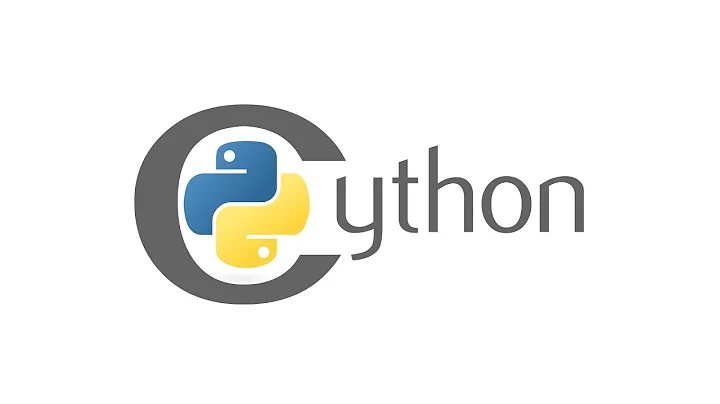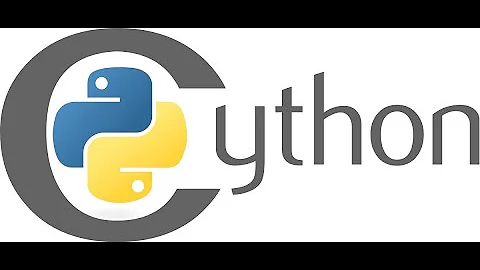Simple wrapping of C code with cython
Solution 1
Here's a tiny but complete example of passing numpy arrays to an external C function, logically
fc( int N, double* a, double* b, double* z ) # z = a + b
using Cython. (This is surely well-known to those who know it well. Comments are welcome. Last change: 23 Feb 2011, for Cython 0.14.)
First read or skim Cython build and Cython with NumPy .
2 steps:
-
python f-setup.py build_ext --inplace
turnsf.pyxandfc.cpp->f.so, a dynamic library -
python test-f.py
import floadsf.so;f.fpy( ... )calls the Cfc( ... ).
python f-setup.py uses distutils to run cython, compile and link:
cython f.pyx -> f.cpp
compile f.cpp and fc.cpp
link f.o fc.o -> f.so,
a dynamic lib that python import f will load.
For students, I'd suggest: make a diagram of these steps, look through the files below, then download and run them.
(distutils is a huge, convoluted package used to
make Python packages for distribution, and install them.
Here we're using just a small part of it to compile and link to f.so.
This step has nothing to do with Cython, but it can be confusing;
simple mistakes in a .pyx can cause pages of obscure error messages from g++ compile and link.
See also
distutils doc
and/or
SO questions on distutils .)
Like make, setup.py will rerun
cython f.pyx and g++ -c ... f.cpp
if f.pyx is newer than f.cpp.
To cleanup, rm -r build/ .
An alternative to setup.py would be to run the steps separately, in a script or Makefile:
cython --cplus f.pyx -> f.cpp # see cython -h
g++ -c ... f.cpp -> f.o
g++ -c ... fc.cpp -> fc.o
cc-lib f.o fc.o -> dynamic library f.so.
Modify the cc-lib-mac wrapper
below for your platform and installation: it's not pretty, but small.
For real examples of Cython wrapping C, look at .pyx files in just about any SciKit .
See also: Cython for NumPy users and SO questions/tagged/cython .
To unpack the following files,
cut-paste the lot to one big file, say cython-numpy-c-demo,
then in Unix (in a clean new directory) run sh cython-numpy-c-demo.
#--------------------------------------------------------------------------------
cat >f.pyx <<\!
# f.pyx: numpy arrays -> extern from "fc.h"
# 3 steps:
# cython f.pyx -> f.c
# link: python f-setup.py build_ext --inplace -> f.so, a dynamic library
# py test-f.py: import f gets f.so, f.fpy below calls fc()
import numpy as np
cimport numpy as np
cdef extern from "fc.h":
int fc( int N, double* a, double* b, double* z ) # z = a + b
def fpy( N,
np.ndarray[np.double_t,ndim=1] A,
np.ndarray[np.double_t,ndim=1] B,
np.ndarray[np.double_t,ndim=1] Z ):
""" wrap np arrays to fc( a.data ... ) """
assert N <= len(A) == len(B) == len(Z)
fcret = fc( N, <double*> A.data, <double*> B.data, <double*> Z.data )
# fcret = fc( N, A.data, B.data, Z.data ) grr char*
return fcret
!
#--------------------------------------------------------------------------------
cat >fc.h <<\!
// fc.h: numpy arrays from cython , double*
int fc( int N, const double a[], const double b[], double z[] );
!
#--------------------------------------------------------------------------------
cat >fc.cpp <<\!
// fc.cpp: z = a + b, numpy arrays from cython
#include "fc.h"
#include <stdio.h>
int fc( int N, const double a[], const double b[], double z[] )
{
printf( "fc: N=%d a[0]=%f b[0]=%f \n", N, a[0], b[0] );
for( int j = 0; j < N; j ++ ){
z[j] = a[j] + b[j];
}
return N;
}
!
#--------------------------------------------------------------------------------
cat >f-setup.py <<\!
# python f-setup.py build_ext --inplace
# cython f.pyx -> f.cpp
# g++ -c f.cpp -> f.o
# g++ -c fc.cpp -> fc.o
# link f.o fc.o -> f.so
# distutils uses the Makefile distutils.sysconfig.get_makefile_filename()
# for compiling and linking: a sea of options.
# http://docs.python.org/distutils/introduction.html
# http://docs.python.org/distutils/apiref.html 20 pages ...
# https://stackoverflow.com/questions/tagged/distutils+python
import numpy
from distutils.core import setup
from distutils.extension import Extension
from Cython.Distutils import build_ext
# from Cython.Build import cythonize
ext_modules = [Extension(
name="f",
sources=["f.pyx", "fc.cpp"],
# extra_objects=["fc.o"], # if you compile fc.cpp separately
include_dirs = [numpy.get_include()], # .../site-packages/numpy/core/include
language="c++",
# libraries=
# extra_compile_args = "...".split(),
# extra_link_args = "...".split()
)]
setup(
name = 'f',
cmdclass = {'build_ext': build_ext},
ext_modules = ext_modules,
# ext_modules = cythonize(ext_modules) ? not in 0.14.1
# version=
# description=
# author=
# author_email=
)
# test: import f
!
#--------------------------------------------------------------------------------
cat >test-f.py <<\!
#!/usr/bin/env python
# test-f.py
import numpy as np
import f # loads f.so from cc-lib: f.pyx -> f.c + fc.o -> f.so
N = 3
a = np.arange( N, dtype=np.float64 )
b = np.arange( N, dtype=np.float64 )
z = np.ones( N, dtype=np.float64 ) * np.NaN
fret = f.fpy( N, a, b, z )
print "fpy -> fc z:", z
!
#--------------------------------------------------------------------------------
cat >cc-lib-mac <<\!
#!/bin/sh
me=${0##*/}
case $1 in
"" )
set -- f.cpp fc.cpp ;; # default: g++ these
-h* | --h* )
echo "
$me [g++ flags] xx.c yy.cpp zz.o ...
compiles .c .cpp .o files to a dynamic lib xx.so
"
exit 1
esac
# Logically this is simple, compile and link,
# but platform-dependent, layers upon layers, gloom, doom
base=${1%.c*}
base=${base%.o}
set -x
g++ -dynamic -arch ppc \
-bundle -undefined dynamic_lookup \
-fno-strict-aliasing -fPIC -fno-common -DNDEBUG `# -g` -fwrapv \
-isysroot /Developer/SDKs/MacOSX10.4u.sdk \
-I/Library/Frameworks/Python.framework/Versions/2.6/include/python2.6 \
-I${Pysite?}/numpy/core/include \
-O2 -Wall \
"$@" \
-o $base.so
# undefs: nm -gpv $base.so | egrep '^ *U _+[^P]'
!
# 23 Feb 2011 13:38
Solution 2
The following Cython code from http://article.gmane.org/gmane.comp.python.cython.user/5625 doesn't require explicit casts and also handles non-continous arrays:
def fpy(A):
cdef np.ndarray[np.double_t, ndim=2, mode="c"] A_c
A_c = np.ascontiguousarray(A, dtype=np.double)
fc(&A_c[0,0])
Solution 3
Basically you can write your Cython function such that it allocates the arrays (make sure you cimport numpy as np):
cdef np.ndarray[np.double_t, ndim=1] rr = np.zeros((N,), dtype=np.double)
then pass in the .data pointer of each to your C function. That should work. If you don't need to start with zeros you could use np.empty for a small speed boost.
See the Cython for NumPy Users tutorial in the docs (fixed it to the correct link).
Solution 4
You should check out Ctypes it's probably the most easiest thing to use if all you want is one function.
Related videos on Youtube
Jose
Updated on June 21, 2020Comments
-
Jose almost 4 years
I have a number of C functions, and I would like to call them from python. cython seems to be the way to go, but I can't really find an example of how exactly this is done. My C function looks like this:
void calculate_daily ( char *db_name, int grid_id, int year, double *dtmp, double *dtmn, double *dtmx, double *dprec, double *ddtr, double *dayl, double *dpet, double *dpar ) ;All I want to do is to specify the first three parameters (a string and two integers), and recover 8 numpy arrays (or python lists. All the double arrays have N elements). My code assumes that the pointers are pointing to an already allocated chunk of memory. Also, the produced C code ought to link to some external libraries.
-
Martinsos about 7 yearsI just recently wrapped my C library using Cython, you may want to take a look at that for an example on how to do it. I explained the whole process in details here, including building and distributing the module: martinsosic.com/development/2016/02/08/….
-
-
Jose almost 14 yearsTrue, but I'd like to wrap other stuff using cython later, so this is my starting point :)
-
oceanhug over 13 yearsIt's really not necessary to use a wrapper function that takes a
char*pointer. You can wrapfcreal()directly in Cython and call it asfcret = fcreal( N, A.data, B.data, <double*> Z.data ). Also, it's error prone and not portable to compilefc.oseparately. Just includefc.cppinsources=. -
 Mike Graham about 13 yearsUsing ctypes even for small wrappers is dangerous and fragile because of the flaws of that general approach (not using header files and so forth).
Mike Graham about 13 yearsUsing ctypes even for small wrappers is dangerous and fragile because of the flaws of that general approach (not using header files and so forth). -
Nikratio over 12 yearsThis will probably produce unexpected results if the passed numpy array is not continous in memory or has Fortran byte order. Also, the required cast is a bit nasty. See below for better cython code.
-
dashesy over 10 yearsDoes this result in an extra memory copy (if array is already contiguous)?
-
Nikratio over 10 years@dashesy: no, if the array is already contiguous, there is no extra copy.
-
Seng Cheong almost 8 yearsThe question asks about Cython; this question does nothing to answer that.
-
 Phillip over 7 years@denis I have a Cython post you may be able to provide insight on.
Phillip over 7 years@denis I have a Cython post you may be able to provide insight on.






